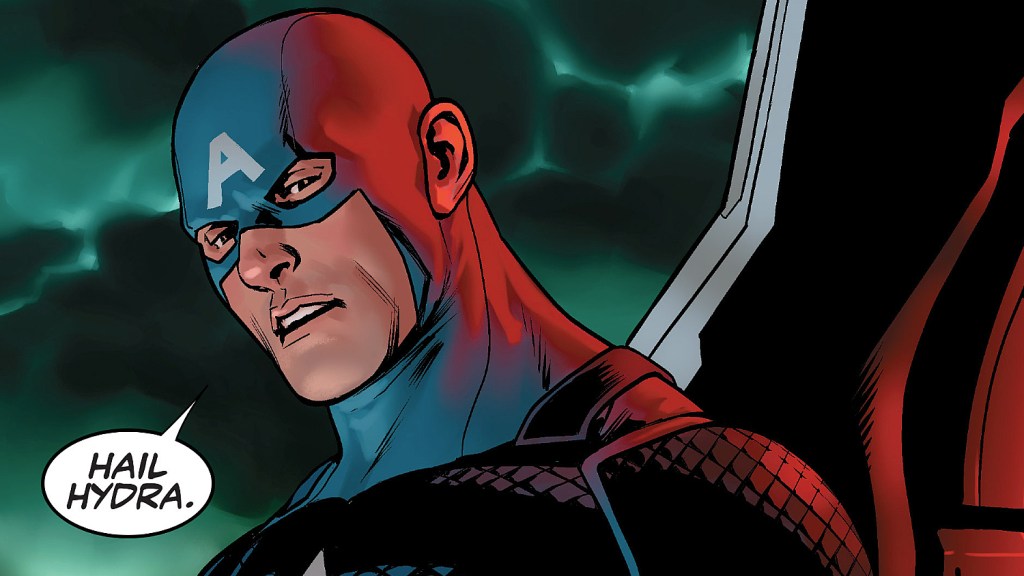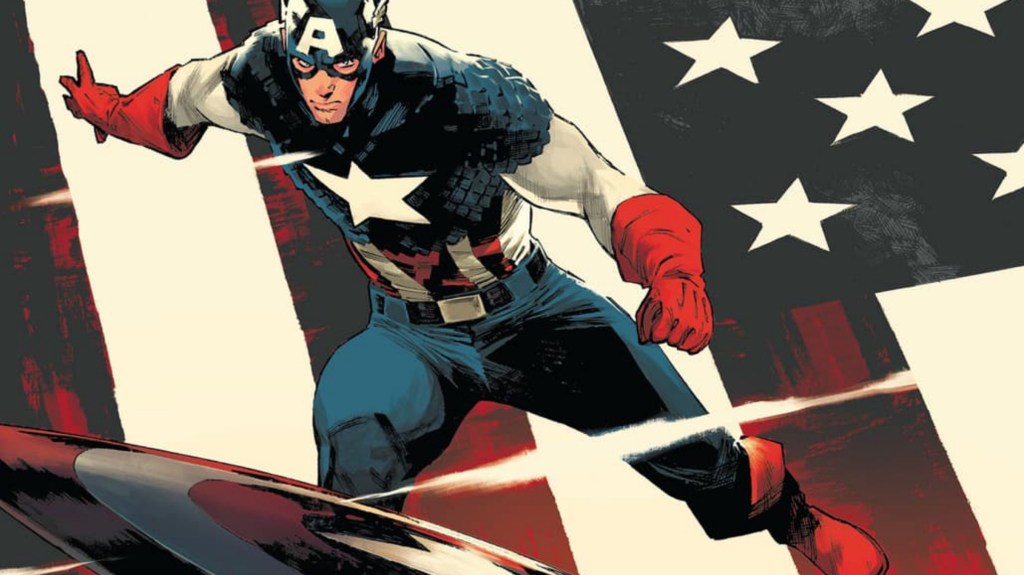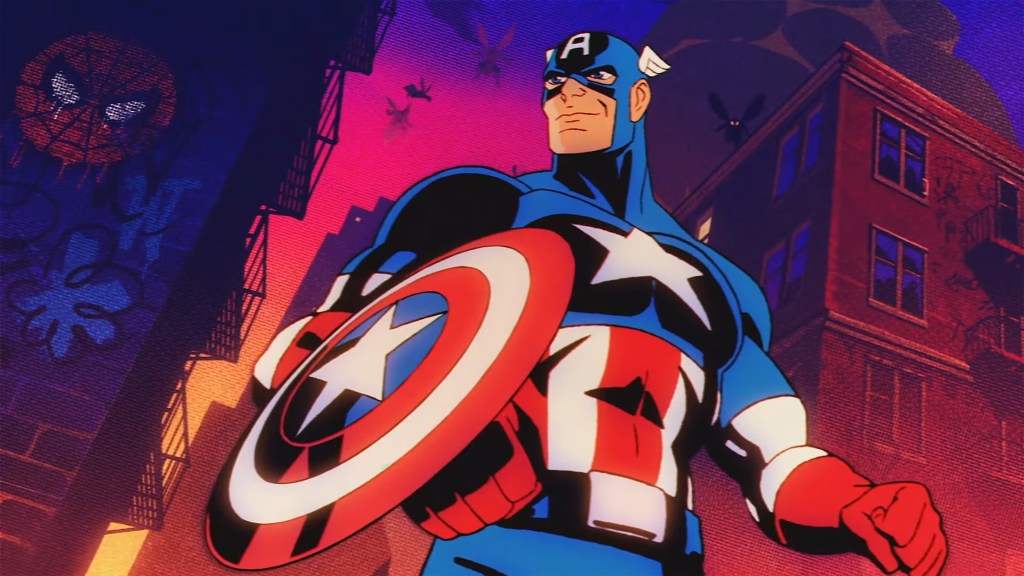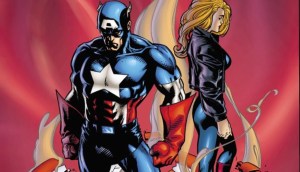
Most superheroes possess a built-in timelessness. Regardless of their debut year, they aren’t so tied to a specific period that it prevents them from adapting and remaining relevant to new generations of audiences. However, this isn’t entirely the case with Captain America. The brainchild of Jack Kirby and Joe Simon in the 1940s, when the United States was in the midst of a war against fascism in Europe and Asia, Captain America was created as a symbol of core American values: patriotism, justice, morality, and an unapologetic stand against tyranny. He was the perfect hero for that era, inspiring Americans during dark times to contribute to the war effort. As a result, Captain America has, among other accolades, become an enduring symbol of traditional American ideals.
Fortunately, as masters of some of history’s most captivating storytelling, Marvel has both the skill and opportunity to “update” Captain America — recasting him as a true American hero better able to meet the moral and political challenges of the modern era, but without abandoning his core ideals. Indeed, with imminent launch of a new Captain America series, by Eisner-nominated author Chip Zdarsky, – which is set to focus on the years after his frozen recovery but before he joins the Avengers – all eyes will be on how Marvel frames his adjustment to a vastly different world than the one he once knew.
The Evolution of Captain America is Necessary, But A Dark-Side Version Is Not the Way

While Captain America resonated strongly with the public during his initial publication run, he no longer connects as easily with contemporary audiences. The disconnect doesn’t stem from the values he once fought to defend, but rather from his inability to adapt his understanding of those values to modern times. In the 1940s, during World War II, patriotism meant defeating fascism, standing up to an unambiguous evil, and protecting the homeland from external threats. Morality was about telling the truth and promoting democracy. Today, in a globalized, complex world, these concepts have become far more nuanced. Patriotism can blur into toxic nationalism. Evil is no longer always black and white, but often shades of grey. Protecting the homeland now requires vigilance both beyond and within national borders. Even truth itself has become contested, with one person’s truth dismissed as another’s fake news.
Captain America wouldn’t be the first character Marvel has “modernized.” For example, Shang-Chi — the Master of Kung Fu — was successfully reimagined to shed the outdated themes and imagery of his original run. However, the key to a Captain America makeover is not to abandon his rich and extensive lore, as was largely done with Shang-Chi, but rather to use that history as the foundation for a deeper, more complete version of Steve Rogers.
There are many ways this could be achieved, but Marvel would be wise to avoid taking him in an extreme or fundamentally contradictory direction. Its decision to “update” Captain America in Nick Spencer and Jesús Saiz’s Steve Rogers: Captain America — by revealing he had secretly been a Hydra agent all along — effectively demolished decades of established lore. More critically, it triggered significant backlash from Marvel’s fanbase, much of which is still being felt today.
Making Captain America Relevant Need Not Compromise His Values

One way to effectively update Captain America is to focus on his old-fashioned ways as a defining element of his character, rather than just a humorous way to show he’s a “man out of time.” For example, having come from an era where right and wrong were seen in clear terms, it makes sense that Rogers wouldn’t buy into the concept of the “anti-hero” or feel comfortable with the idea of committing questionable acts for a supposed greater good. The new series could show how he encountered these differences on his first mission and ultimately decided that his old way is the better way.
It will show how Cap adapted his old-fashioned ways to new challenges that are far less clear-cut than before. In the process, the series will delve into Cap’s psyche, exploring what struggles —if any— he faced in reconciling his values with a modern world. This deeper insight will provide valuable context, helping us understand why Captain America is who he is. Rather than being outdated, his core principles — right versus wrong, kindness over hatred — still matter. But the series will also reveal how his understanding of these ideals, like ours, has evolved, can evolve, and should continue to evolve. This will make Captain America more relatable while preserving his core identity.
An “Update” Captain America Might Make Him the Most Relevant Marvel Character of This Era

Another option for reimagining Captain America, one that’s distinct yet connected to the first approach, is to shift focus from “Cap the Hero” to the burdens that come with being a highly visible figure relied upon by countless others in various ways. Captain America makes heroism look effortless, but it certainly can’t be. Unlike other heroes like Daredevil and Black Widow, Captain America’s role extends beyond fighting evil; he’s also tasked with protecting American interests and promoting American values. This raises questions worth exploring: How does Steve Rogers cope with being not only America’s First Avenger but also a steadfast symbol of truth and hope?
Pulling back the curtain to illustrate and explore the “blood, sweat, and pain” involved in establishing and maintaining the Captain America ideal allows us to see the other side of “the legend.” This depiction will foster a more humanized understanding of both Cap and Steve Rogers. He is, after all, more than just a symbol. The pressure of knowing that every decision, appearance, and battle will be scrutinized not simply as the actions of a particular hero but as a statement from Captain America must be overwhelming. It’s a burden few other heroes carry. Exploring that weight doesn’t diminish Captain America’s standing as a hero, rather, it offers a more complex understanding – one that ultimately should be more inspiring to contemporary audiences.
The post Captain America Has Gotten Outdated (But Marvel Can Fix That) appeared first on ComicBook.com.


